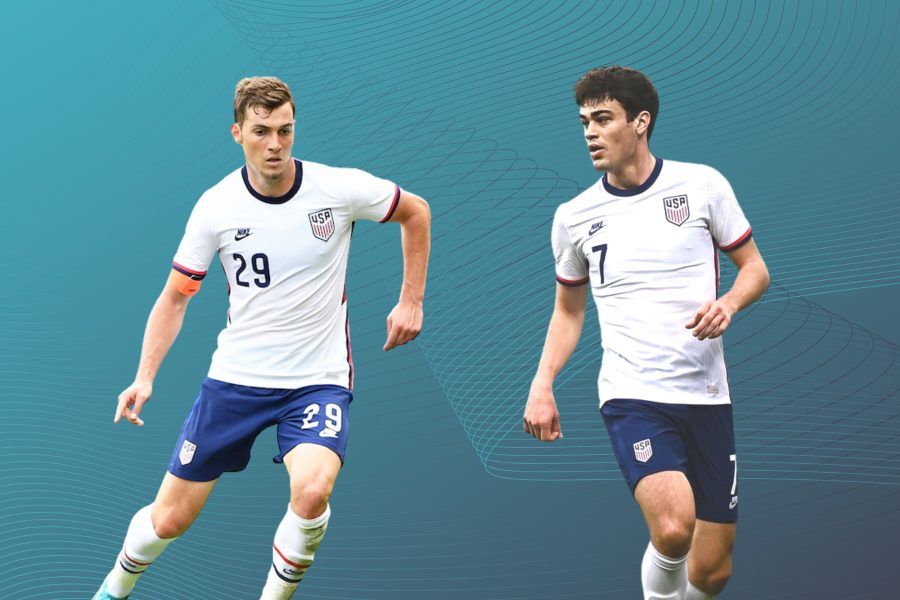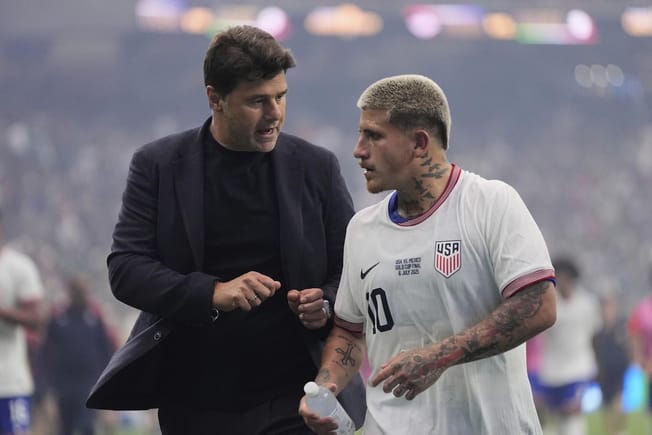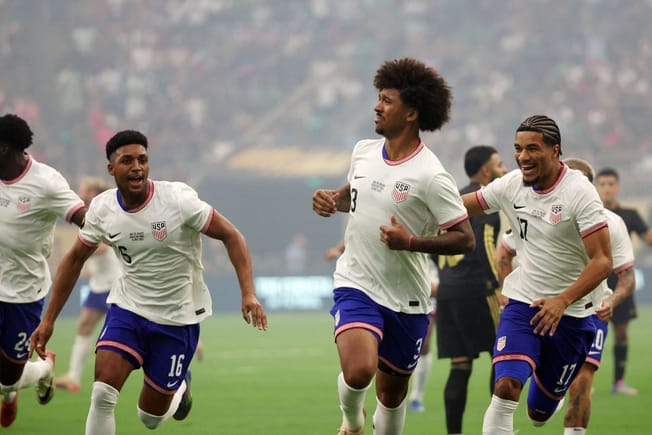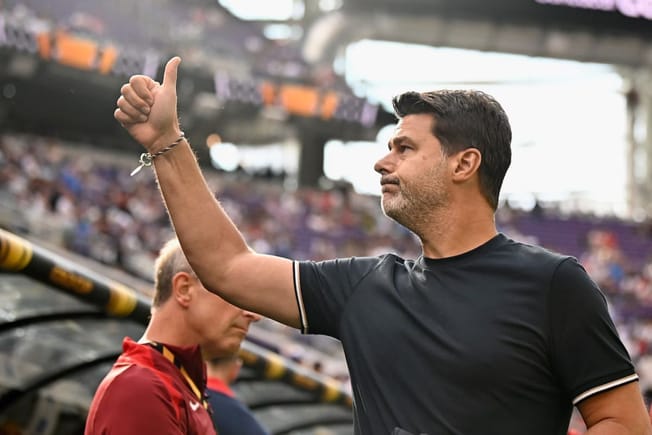Quick Hits
- Gio Reyna and Joe Scally have known each other since they were kids. Now they’re at the World Cup together with the United States
- The two Americans have been together for nearly every step of their professional careers: from youth soccer, to New York City FC’s academy, to the Bundesliga, and to the national team
This piece, which was originally published on October 12, 2022, has been updated after the U.S. released their roster for the World Cup in Qatar.
Gio Reyna and Joe Scally go way back.
“I think we first played against each other when we were eight or nine in a state cup game, my team [New York Soccer Club] won 3-1–” Reyna explained until Scally quickly cut him off.
“No, we need to fact check that.”
“No, I definitely won. I promise you I won,” Reyna responded with a calm dismissiveness, like he’s shrugging off a defender while he glides with the ball.
There was plenty of banter between the best friends during our conversation inside the U.S. men’s national team hotel in Cologne, Germany. It’s their first senior team camp together and it’s fittingly being held in North-Rhine Westphalia, now their adopted home state. Scally is a Lake Grove, Long Island native, and Reyna was raised in Bedford, NY, about 40 miles north of Manhattan. They enjoy reflecting on a journey they’ve mostly shared from New York City Football Club to the Bundesliga.
“I was already on the [NYCFC] U-14s at the time. It was halfway through the year he came–” Reyna recalled.
“On like a winter transfer,” Scally interjected.
“Winter transfer,” Reyna said with a chuckle. “And then I guess the rest is history.”
FROM NYCFC’S ACADEMY TO THE BUNDESLIGA
In training as kids back in New York, the two were competitive by design.
“He was always a forward, I was the defender,” Scally said.
“And our coach would do it on purpose to put us against each other,” Reyna said. The two became inseparable. “We used to see each other every day at practice. We saw each other at least four to five times a week and most days we were pretty much always together. Solid 10 hours a week together.”
These two go wayyyyy back pic.twitter.com/ymiX7oL2Y1
— MLS Buzz (@MLS_Buzz) February 20, 2022
“When we would go away for games, we were always roommates,” Scally added.
That whole roommate thing didn’t last long.
“They’d always put us together until it got to a point where we were messing around too much. The first year we were always together and then I think we got in trouble at a few tournaments and then they had to move us around,” Reyna said as they both laughed.
Reyna and Scally certainly had no trouble winning tournaments with NYCFC’s academy.
“It was too easy. Everyone says FC Dallas and LA Galaxy, nah. We were way better than all of them. We smacked all of them playing two years up,” Reyna asserted, emphasizing the age difference.
Reyna and Scally were destined to be pros, and the question was which path they’d take: sign a Homegrown contract with NYCFC or head to Europe as soon as possible? European interest rose after the pair propelled the U.S. U-15s to the Torneo Delle Nazione title in 2017, with Scally equalizing late before Reyna netted a dramatic winner to beat England in the final.
“It’s a pretty big tournament with all the best countries. That was our first kind of experience with European soccer, that’s when the first [European club] interest started to come upon us. That was when it all kicked off for us,” Reyna said.
“Right after that camp, yeah, it was,” Scally confirmed.
TIME TO MOVE
Growing up, Reyna was arguably the most talented American prospect ever.
He would body older defenders off the ball, turn in tight spaces, create chances, and score goals – and his access to a Portuguese passport enabled him to jump to Europe at 16. Scally, meanwhile, didn’t have a European passport, so he had to wait until he was at least 18 to leave the U.S. in accordance with FIFA regulations. Scally opted to sign a Homegrown deal with NYCFC when he was 15. NYCFC’s sporting director at the time was none other than Gio’s father and USMNT legend, Claudio Reyna.
“It was always different because he’s still like my boss. Every time I’d go hang out with Gio, Gio would always be like ‘your boss is here.’ It was always funny but of course off the field, it’s like a family relationship,” Scally said. “Our families are close. I’m close with his siblings, he’s close with mine. He even went out to dinner one time with my older brother Drew in the city and I wasn’t even there, like that’s how close we are with each other. My younger sister Anna always talks to his sister [Carolina] through Snapchat and things like that. So we’re close.”
Reyna followed Christian Pulisic’s footsteps when he joined one of Europe’s renowned talent incubators, Borussia Dortmund, in 2019. Later that year, Scally’s transfer to another notable Bundesliga club, Borussia Mönchengladbach, was announced as well, though he wouldn’t be able to move until his 18th birthday at the end of 2020.
“We always talked about wanting to go to Europe at some point… it couldn’t have worked out any better, to be honest,” Reyna said.
Like Pulisic, Reyna was only 17 when he broke through with Dortmund’s first team in early 2020. Scally wasn’t surprised.
“Obviously I knew Gio was gonna be able to do it. When he played with the youth team, it was obvious. Of course when he was there, you hope you can be there because someone on your team is there. All of us wanted to go and play in Europe. So when Gio was able to deal with it, it helped all of us out.”
18-year-old Joe Scally is the third youngest American with a Bundesliga goal.
— Paul Carr (@PaulCarr) October 2, 2021
🇺🇸 Christian Pulisic (17)
🇺🇸 Gio Reyna (17)
🇺🇸 Joe Scally (18y, 275d)
Scally had barely played for NYCFC’s first team when he left for Gladbach, but a strong preseason combined with injuries to first team regulars opened the door for him to earn Bundesliga minutes in 2021. He’s been the first choice right back this year, while Reyna has been in and out of Dortmund’s lineup due to various injuries over the last two seasons.
ADJUSTING TO LIFE ABROAD
Life in Germany hasn’t been all sunshine and roses for the two USMNT teammates. Learning German, for example, has proven difficult for Scally.
“Of course I was stressing at first. I was taking lessons [before I came] and doing Duolingo for four months,” Scally said.
“Four months of what? You can’t even speak a word of German now, four months of what?” Reyna asked, ruthlessly ribbing Scally. “His German is terrible.”
“My German is not good,” Scally conceded, but defended his slow progress. “I was doing lessons two times a week, and then Corona started to get really bad and so I had to stop because I wasn’t allowed to see my teacher….But now I’m getting back to it two times a week, but it’s these little breaks, whether it’s with the national team or where you go home that if you’re not doing it for a week or two weeks for me at least, I kind of forget everything. I don’t know, maybe I still have another year or two years to learn the ABCs.”
Reyna laughed. “That’s fair. I thought you were gonna say another year or two till you’re fluent. No.”
And Reyna’s German?
“It’s much better than his, that’s all I know,” Reyna claimed. Now Scally is annoyed, and it’s an extra rapid exchange.
Scally: “I don’t know why you keep saying that.”
Reyna: “I came when I was younger, so I lived in the Dortmund dorm – ‘Jugendhaus’ they say – with all the German kids–”
Scally: “What do they say?”
Reyna: “‘Jugendhaus’, like the kid–”
Scally: “Oh, I just wanted to hear you say [Jugendhaus].”
Scally grinned, and Reyna realized his pronunciation was being tested. He chuckled and continued. “At that time I was young, and there were the dorm parents that always made sure I was going to German lessons. So I did it at least twice a week for like two hours. I’d say after a year I got pretty good at it. Once I went to the first team I stopped doing the lessons but I definitely have a really good base. If I went to a restaurant or… anything that I need to know I definitely can speak it and understand it fully.”
Friends 🇺🇸 pic.twitter.com/zAJKSgYJDv
— Borussia Dortmund (@BlackYellow) February 20, 2022
Reyna and Scally can still get by speaking English, and, to be fair, they don’t need to be completely dependent on German food.
“I never really got into the German food, schnitzel or bratwurst. You try it, but there’s so many Italian restaurants here. Of course it’s not the same as home but I’m eating pasta, or rice and chicken, the normal base things,” Scally said.
“You can find good food anywhere, you just have to look a little bit and find decent restaurants,” Reyna added.
Reyna and Scally notice the lack of fast food and fast casual restaurant chains in Germany compared to back home. They’re not tempted to drive hours to get Chipotle like Pulisic, although they do count on their families to provide a taste of the States when they visit.
“They bring a lot of stuff. My mom brings bagels,” Scally said.
“They bring all our favorite snacks. My mom brings pancake mix, she brings taco spices,” Reyna said.
Reyna’s mother, Danielle, starred at UNC and made six appearances for the USWNT. She and Claudio lived in Germany themselves during the first part of his pro career with Bayer Leverkusen and Wolfsburg. Initially, though, it was just 21-year-old Claudio in Germany.
“When my dad first came over he had no technology. So I don’t know how he did it, but imagine? I think my mom and my dad could call each other like once a week,” Reyna said.
Like his youth club, high school, and eventual USMNT teammate Claudio, current national team manager Gregg Berhalter also began his professional career in Europe in 1994. At a media roundtable in Cologne, Berhalter described the struggle to speak to friends and family. “I was spending $5 a minute on phone calls. Seriously. Then they came out with this IDT – IDT was a calling card or something -and it was 48 cents a minute. It was ridiculous what the phone bills were back then.”
“We’re pretty fortunate with FaceTime now, we can call whoever we want whenever we want to keep us entertained,” Reyna said, not taking technology for granted. “YouTube, Netflix–”
Scally: “I play Xbox a lot–”
Reyna: “I play a little bit of PlayStation at times. Watching soccer, obviously the season is full throttle now. So there’s a lot of games every day of the week–”
Scally: “What we just got – what was very important – was a new couch. We both got the same couch. It’s like a bed, like a big bed.”
Reyna: “If you’re on it, you don’t wanna get up.”
Scally: “That’s why it’s perfect, you just lay down all day. Watch YouTube, play Xbox.”
“IT CAN GET PRETTY LONELY AT TIMES”
Reyna and Scally will both turn 20 over the next few months. At that age, many Americans are reveling in the round-the-clock, multifaceted social lives that you often find at college. Or they’re working a nine-to-five job with little flexibility or free time. Life is very different for these Americans plying their trade abroad.
Reyna and Scally said it’s difficult to see their friends their age during the season, especially their soccer buddies who are busy with NCAA ball.
“I have some friends that are older now, and they’re working. So they try to come when they can, I know they come every few months if they can. But yeah, I think both of us are always welcome to having visitors,” Reyna said, and they both laughed. “Cause it can get pretty lonely at times.”
While college challenges kids to effectively manage their free time – to balance academic success with maximizing the extracurricular value of their university – Reyna and Scally just want to kill that time.
Reyna: “Every day–”
Scally: “It’s a battle.”
Reyna: “It’s hard and everyday you’re only at the facility for what, four hours max? Other than that, you just gotta try to figure it out for yourself. So you have 20 hours of the day, of course you sleep but you probably have 12 to 14 hours of the day when you’re trying to figure out stuff to do to keep you entertained when you’re alone. And during Corona, you couldn’t do anything.”
While U.S. manager Berhalter encourages his squad based abroad to culturally immerse themselves, he acknowledges they’ve faced an obstacle he did not. “I did a Bundesliga interview and they’re talking about COVID, and Gio and Joe Scally during COVID. And like, think about that. These kids are 18, 19 years old. They’re alone in an apartment for months on end, and all they have is training. That’s the only thing that they can go to. That’s tough.”
“During Corona, it was hard because you’re at the facility for less time because they kind of want you just there to train and go home so no one gets sick. And when you go home, there’s no restaurants, there’s nothing, no stores open. The only way to get through that honestly was, like, YouTube and Xbox,” Scally said.
“And then each other I guess. I would come up and visit him. But other than that, couldn’t really see anyone,” Reyna said. Reyna and Scally recall how even the first time they had planned to hang out in Germany – to watch the Super Bowl – a snowstorm prevented Scally from driving to Dortmund.
THE JOURNEY’S NEXT STEP
The American public will tune in to the planet’s most popular sporting event in November and notice, at minimum, that teens establishing themselves as professionals in Europe is now the norm. A few wins in Qatar and that new normal will be aggressively celebrated in anticipation of the 2026 World Cup on home soil. Countless kids will absorb the stories of their newfound models and dream of their own European soccer fairy tale.
But the sacrifice it requires shouldn’t be overlooked.
Reyna: “You just gotta keep on grinding, pretty much. That’s the only way you look at it. You gotta have your close friends, family–”
Scally: “People don’t see how hard it is. Whether it’s people that write about it, or… they don’t see this type of stuff.”
Reyna: “They don’t get it. And if the only way you can really understand is if you’re in it.”
Scally: “It’s not so shiny.”
Reyna: “It’s not as easy as it looks.”
Scally: “It’s not just money and fame.”
Reyna and Scally hang out on all of their off days. Scally’s place is in Düsseldorf, a livelier city than Dortmund. They’ll golf, get food, shop, and relax. At this stage of their career, it’s ideal that they still have each other.
Gio Reyna and Joe Scally hanging out in Germany 🇩🇪❤️ pic.twitter.com/odSXlkCoCr
— USMNT Only (@usmntonly) September 18, 2022
Scally: “He’s a really loving guy. People might see him as a fierce competitor on the field. He gets angry sometimes quickly…”
Reyna: “I’d say you’re pretty good with that. I think the way I am off the field is very different than–”
Scally: “Yeah, that’s what I’m trying to get at. When he’s off the field, he’s different than when he’s on the field.”
Reyna: “I would probably say I’m a d*** too when I play, but that’s how it is.”
Underlying all the banter is a mutual gratitude for their friendship, one that goes way back. And another chapter in their journey, like Claudio and Berhalter’s, is the unparalleled experience of a World Cup. It’s time for the two best friends to take their next step, as always, together.







Comments